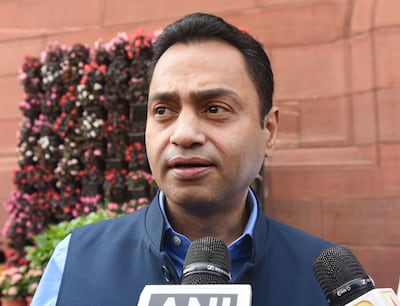Dr K Padmarajan has contested and lost 240 elections in the past 36 years, but the man dubbed India's “election king” is undeterred and in the running once again as the country holds the world’s largest election starting this week.
India will hold a seven-phase election for the Lok Sabha, the lower house of Parliament, from Friday. The results will be announced on June 4. Nearly 970 million people are eligible to vote – the world's largest electorate.
Dr Padmarajan, from Mettur in the southern state of Tamil Nadu, is among more than 1,600 candidates standing for the 102 seats for which polling is being held in the first phase.
The 64-year-old tyre shop owner, who has also trained as a homeopathic doctor, has been contesting elections as an independent candidate since 1988, with tyres as his electoral symbol.
He has contested unsuccessfully in local municipality polls, 73 state assembly elections, 32 Lok Sabha elections, including against former prime ministers Atal Bihari Vajpayee and Manmohan Singh and incumbent Prime Minister Narendra Modi, as well as in 50 elections for the Rajya Sabha, the upper house of Parliament, and six presidential elections.
Dr Padmarajan's streak of losses have already earned him a place in the Limca Book of Records – the Indian version of the Guinness World Records.
“Failure, failure, failure. Not a single victory!” Dr Padmarajan told The National.
“I started fighting elections in 1988 as a simple citizen. But no one voted for me, and I only faced failure. But this failure has given me fame so I tell people to not vote for me so I can retain the record. I’ll get a heart attack if I win.”
In this election, Dr Padmarajan is standing for parliament from Tamil Nadu's Dharmapuri district, where voting will be held on Friday, and from Thrissur in neighbouring Kerala state, which goes to the polls on April 26

Long-time losers
India allows eligible citizens to stand for election from more than one constituency, whether as candidates of a political party or as independents.
Independent candidates are at a disadvantage compared to those fielded by political parties, which spend billions of rupees to reach out the voters through mass rallies and advertisements.
Vijayprakash Kondekar, 77, a retired government employee from Pune, in the western state of Maharashtra, who has contested and lost 24 elections over the past three decades, is seeking to level the playing field by advocating zero-budget poll campaigns.
“Political parties run for elections on money from the pockets of people. If leaders have worked for the people, why do they need these big rallies and campaigns? I am against this,” Mr Kondekar told The National.
Wearing a cotton dhoti, a traditional sarong, the septuagenarian with a long flowing beard campaigns by walking around with a sign, sometimes on a metal cart, that says “Main Pradhanmantri” – Hindi for “I am Prime Minister” – and urging voters to pick his electoral symbol, a boot, on the electronic voting machines used in India's polls.
The only financial support he is seeking is a donation of one rupee per person towards the cost of filing his nomination papers – about 25,000 rupees ($300) – from Pune constituency, which goes to polls on May 13.
“I return one rupee if somebody gives me two rupees. This is my style of communication,” he said.

Richest and poorest candidates
But not every candidate needs to seek donations.
Nakul Nath, whose father Kamal Nath was chief minister of the central state of Madhya Pradesh between 2018 and 2020, is the richest candidate in the first phase of elections.
Mr Nath, 49, who is seeking re-election from the state's Chhindwara constituency as a candidate of the main opposition Indian National Congress party, has assets worth 7.16 billion rupees ($86 million), according to his election affidavit submitted to the Election Commission.
At the other end of the scale is Ponraj K, 58, from Thoothukudi in Tamil Nadu, who has declared total assets worth 320 rupees ($4), according to his affidavit.
Alleged criminals in the running
A total of 252 out of the 1,625 candidates in the first phase of the election have criminal cases against them, according to an analysis of their sworn affidavits by the Association for Democratic Reforms (ADR), a non-governmental organisation, and National Election Watch, a coalition of civil society groups.
Under India's election rules, citizens facing criminal cases can stand for election, but are disqualified if subsequently convicted and sentenced to a prison term of two years or more.
Seven candidates said they were facing murder charges while 19 face cases of attempted murder.
Out of the 77 candidates fielded by Mr Modi's Bharatiya Janata Party, 28 face criminal cases, as do 19 of the 56 Congress party candidates.
Among regional parties, all four candidates of the Rashtriya Janata Dal in Bihar state face criminal cases, and 13 of the 22 candidates of the Dravida Munnetra Kazhagam, the ruling party of Tamil Nadu state, according to the ADR and National Election Watch analysis.
The Samajwadi Party in the northern state of Uttar Pradesh has three candidates facing criminal cases among the seven standing in constituencies that vote on Friday, while the All India Trinamool Congress in West Bengal, in eastern India, has two among its five first-phase contenders.


